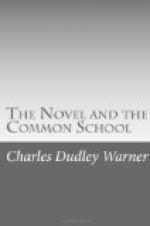Criticism which condemns the common-school system as a nurse of superficiality, mediocrity, and conceit does not need serious attention, any more than does the criticism that the universal opportunity of individual welfare offered by a republic fails to make a perfect government. But this is not saying that the common school does all that it can do, and that its results answer to the theories about it. It must be partly due to the want of proper training in the public schools that there are so few readers of discrimination, and that the general taste, judged by the sort of books now read, is so mediocre. Most of the public schools teach reading, or have taught it, so poorly that the scholars who come from them cannot read easily; hence they must have spice, and blood, and vice to stimulate them, just as a man who has lost taste peppers his food. We need not agree with those who say that there is no merit whatever in the mere ability to read; nor, on the other hand, can we join those who say that the art of reading will pretty surely encourage a taste for the nobler kind of reading, and that the habit of reading trash will by-and-by lead the reader to better things. As a matter of experience, the reader of the namby-pamby does not acquire an appetite for anything more virile, and the reader of the sensational requires constantly more highly flavored viands. Nor is it reasonable to expect good taste to be recovered by an indulgence in bad taste.
What, then, does the common school usually do for literary taste? Generally there is no thought about it. It is not in the minds of the majority of teachers, even if they possess it themselves. The business is to teach the pupils to read; how they shall use the art of reading is little considered. If we examine the reading-books from the lowest grade to the highest, we shall find that their object is to teach words, not literature. The lower-grade books are commonly inane (I will not say childish, for that is a libel on the open minds of children) beyond description. There is an impression that advanced readers have improved much in quality within a few years, and doubtless some of them do contain specimens of better literature than their predecessors. But they are on the old plan, which must be radically modified or entirely cast aside, and doubtless will be when the new method is comprehended, and teachers are well enough furnished to cut loose from the machine. We may say that to learn how to read, and not what to read, is confessedly the object of these books; but even this object is not attained. There is an endeavor to teach how to call the words of a reading-book, but not to teach how to read; for reading involves, certainly for the older scholars, the combination of known words to form new ideas. This is lacking. The taste for good literature is not developed; the habit of continuous pursuit of a subject, with comprehension of its relations, is not acquired; and no conception is gained of the entirety of literature or its importance to human life. Consequently, there is no power of judgment or faculty of discrimination.




